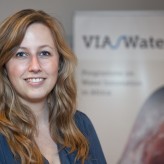Three new projects about to start
Added value to fecal sludge and urine
Quite a number of project applications for the VIA Water Innovation Programme are focused on the valorization of end products in the sanitation chain. For this theme, the VIA Water Programme is creating a thematic group in its community If you would like to join this group, please contact Roos ter Horst via r.terhorst@viawater.nl.
These weeks, VIA Water is signing three contracts under this main topic fund.
Vegetable greenery at Safi Sana treatment plant
The project is establishing a green house for seedlings, that are grown on compost and using nitrate rich waste water from Safi Sana’s fecal sludge treatment plant in Accra, Ghana. With this ‘seedlings production line’, Safi Sana tries to create added value to the compost and nitrate rich effluent. It is meant as an alternative to the direct compost sale to farmers, which is very difficult in Ghana, since farmers are used to other fertilizers with low prices because of subsidies. The uptake of compost is also low because of unawareness. The pilot is trying another market channel for the compost. It will add value to farmers by providing a total package of seedlings and compost products. If successful, this additional income stream can be built in in all future Safi Sana treatment plants and alike. In this project, Safi Sana is partnering with the Dutch organisations Wageningen University and East West Seeds International and with a Ghanaian wholesaler on horticultural products: Tikola Ltd.
The projects are primarily a contribution to Sustainable Development Goal SDG 11 (sustainable cities and communities), with secondary impacts on SDG 3 (health), SDG 6 (water and sanitation), SDG 8 (decent work and economic growth) and SDG 13 (Climate action), but also addressing other SDGs (SDG5: gender equality, SDG11 life below water and SDG15 life on land).
Bio-fuels and Bio-fertilizer in Nakuru
Another VIA Water contract was signed with Vitens Evides International, as lead agency of a consortium with NAWASSCO, SNV and Scope Ltd in Nakuru, Kenya. Egerton University will provide knowledge support. These parties have developed certain product lines for waste products. The VIA Water contract is for a Proof of Concept for struvite and compost as bio-fertilizers and for Briquettes as bio-fuel. After a positive Proof of Concept, the partners go for quick upscaling, expanding the waste collection, production facilities and sale of briquettes for improved cook stoves and compost and struvite for farmers
Eight demo’s of ecosanitation in Mali
Sanitation levels in Mali are low and could be boosted by innovations. The Stichting VAM intends to build 8 demonstration eco-toilets on the compound of a women’s vocational training centre, where compost and urine can be used directly in the centre’s vegetable garden. Ecosanitation is still an innovation in the region of Bandiagara, Mali. In the project, the Uganda based women's organization Katosi will provide support. Two demo’s will have wheelchair access and two toilets will be designed for application for ordinary households. Women, studying at the centre, will be trained in building and maintaining the toilets themselves. Despite of its small scale, this project has the potential to make a change, in which fecal sludge and urine are re-used at household and small-scale farming level.
The projects are primarily a contribution to Sustainable Development Goal SDG 11 (sustainable cities and communities and SDG 6 (water and sanitation, with secondary impacts on SDG 3 (health), SDG 8 (decent work and economic growth) and SDG 13 (Climate action), but also addressing other SDGs (SDG5: gender equality, SDG11 life below water and SDG15 life on land).


